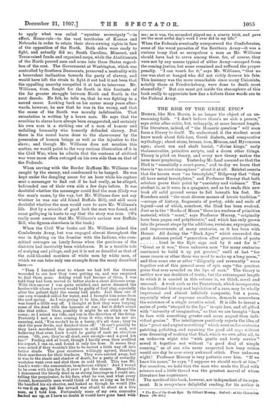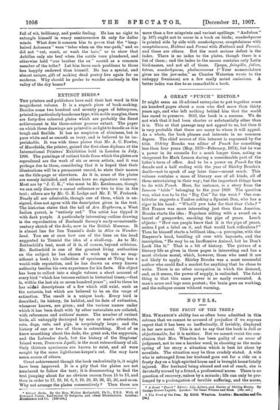THE RISE OF THE GREEK EPIC.*
HOMER, like Mrs. Harris, is no longer the object of an un- reasoning faith. "I don't believe there's no rich a person," says critic after critic, but, unhappily, at more learned length. The literature, indeed, of " the Homeric question " will soon form a library to itself. To understand it the student must know much about folk-lore, Greek dialects, and comparative mythology; about stone, bronze, iron, Minoan, and Mycenaean ages ; about urn and shaft burial, " divine kings," early thalassocraties, primitive scripts, and a dozen other things. Theory is piled on theory, and every new theory makes the issue more perplexing. Yesterday Mr. Leaf assured us that the Iliad is "essentially a court-poem," and to-day we learn that there is " no court atmosphere " about it at all. Reichel asserts that the heroes wore "no breastplate," Ridgeway that "they all have metal breastplates," and Professor Murray that both scholars prove their point by "casuistry and violence." The student is, as it were, in a quagmire, and as he reads this new book all solid ground seems to fail beneath his feet. He flounders amid "the most diverse masses of heroic tradition" —scraps of history, fragments of poetry, odds and ends of legend—out of which, somehow, the Iliad has been evolved. Just as in the " Books of Moses " there is a nucleus of primitive material, which " must," says Professor Murray, " originally have been pagan and polytheistic," and which has only grown into its present shape by the additions, revisions, expurgations, and improvements of many centuries, so it has been with Homer. All during the "Dark Ages" which succeeded the great Achaean period "generation after generation of poets lived in the Epic saga and by it and for it." "Great as it was," these unknown men "for many centuries continued to build it up yet greater," until at last "for some reason or other there was need to make up a long poem," and then some one or other " diligently and reverently " wove together out of this general mass of epic saga "the greatest poem that ever sounded on the lips of man." The theory is neither new nor destitute of truth ; but the extravagant length to which it is carried in this volume is, we think, novel and unsound. A work such as the Pentateuch, which incorporates the traditional history and legislation of a race, may be wholly impersonal and almost infinitely composite, but a poem, especially when of supreme excellence, demands somewhere the existence of a single creative mind. It is idle to invent a series of poets "steeped to the lips" in epic lore, and all gifted with " intensity of imagination," so that we are brought "face to face with something greater and more august than indi- vidual genius." The intelligence positively rejects the idea of this "great and august something " which went on for centuries patching, polishing, and repairing the good old saga without ever dreaming of making that Iliad, which we owe, after all, to an unknown wight who " with gentle and lowly service" sewed it together not without "a good deal of simple cunning," as of one who never suspected how busy critics would one day be over every awkward stitch. Poor unknown wight! Professor Murray is very pathetic over him. "If we knew his name," he says, "I suppose we should mock at him." For ourselves, we hold that the man who made the Iliad with scissors and a little thread was the greatest marvel of whom literature has cognisance.
The merits of this book, however, are independent of its argu- ment. It is everywhere delightful reading, for its author is
• The Risa of the Greek Epic. By Gilbert Murray. Oxford : at the Chromion Press, De. net.]
full of wit, brilliancy, and poetic feeling. He has no right to entangle himself in weary controversies fit only for duller minds. What does it concern him to prove that the "long- haired Achaeans " were "taboo when on the war-path," and so did not " cut, comb, or wash the hair," or to show that Achilles only ate beef when the cattle were plundered, and otherwise held "our brother the ox" sacred as a common member of the tribe ? Let him leave such problems to those less happily endowed than himself. He has a special, and almost unique, gift of making dead poetry live again for us moderns. Why should he prefer to wander aimlessly in the valley of the dry bones P















































 Previous page
Previous page